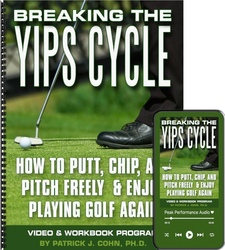
How to Stay Mentally Tough in Golf
How capable are you of maintaining your cool after a bad shot? Do you “freak out” after you mishit a ball?
Attitude is everything in golf. Your attitude shapes how you see things, and your perspective affects your thoughts and feelings.
Many golfers see golf as an emotional sport and have difficulty managing their emotions. A great shot will put these types of golfers on cloud nine and feel unbeatable, and a lousy shot will cause them to become angry and lose their confidence.
A golfer from our Golf Mental Game Survey asked the following question:
“How do I contain my anger; control my emotions? Generally, I find it hard to control my anger. How can I prevent or constructively release anger?”
Maintaining your composure can be challenging when playing in a highly competitive round. However, if you equip yourself with sound strategies, a few bad shots or being outplayed won’t be a crushing blow to your game.
The best way to keep your cool is to prevent your emotions from becoming too intense. You will be more than disappointed if you expect never to make a mistake or always play your “A” game.
You will be angry and frustrated. When negative emotions are high, your performance plummets.
When you play a round of golf, you should understand that every shot will not go as planned.
You can focus on playing each shot the best way possible, but many factors may lead to a bad result. You must accept that you, just like every other golfer in the world, will make mistakes.
With this mindset, you can lessen the intensity of negative emotions. In that manner, one bad shot won’t lead to three horrible holes.
Take for instance 21-year-old PGA golfer Rasmus Hogjaard. Hojgaard is a two-time winner on the European Tour…
Hogjaard was set to finish the first round at the 2022 Valero Texas Open, but he drove the ball well left of the fairway on the closing hole. Hogjaard needed four shots to reach the green on the par-4 hole.
After the round, Hogjaard commented on his double-bogey but put his performance in perspective…
HOGJAARD: “I had to chip sideways back into the fairway. Just was a little too aggressive after that. Yeah, short-sided myself, and I didn’t get up and down, and suddenly you walk away with double-bogey. Yeah, that was a bit annoying, but it happens.”
Hogjaard still experienced negative emotions, he was annoyed, but his perspective was simple, “bad shots happen.”
To keep your emotions in check, understand four things:
1. You won’t hit every shot perfectly.
2. Nobody hits every shot perfectly.
3. Perspective is everything
4. You can learn to control your emotions after bad shots.
Staying Calm after a Bad Shot:
A bad shot is just a fact–it does not have emotions attached to it. But you can attach emotions to that shot!
How you perceive or react to a bad shot will influence your emotions, such as “I should never hit a ball out of play.”
The key to staying calm is to change your REACTION to bad shots by thinking differently: “Even the pros hit shots out of play. I’m not perfect.”
Related Golf Psychology Articles
- How to Start the Round with a Calm Mindset
- How to Stay Calm Over the Golf Ball
- How Scheffler Maintains Composure
- Subscribe to The Golf Psychology Podcast on iTunes
- Subscribe to The Golf Psychology Podcast on Spotify
Discover How to Break the Yips Cycle

know you are frustrated with your putting, chipping, or pitching and have considered giving up the game you once loved to play. But before you make that decision, read what I have to say about how I help golfers overcome the yips….
The first place to begin to break the Yips Cycle is to admit that the yips are a mental issue. Stabbing or flinching at impact are symptoms of bigger issues: fear and over control. Changing your grip, putter, swing, club, or routine are only temporary Band-Aids to a mental game issue.
“Breaking The Yips Cycle” is a complete brain dump of the TOP NINE mental training sessions I do with my personal coaching students to help them overcome the yips and play with freedom again!